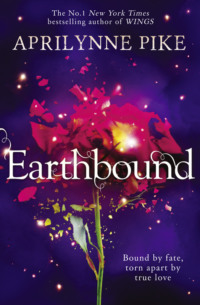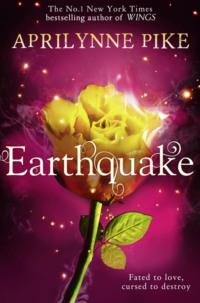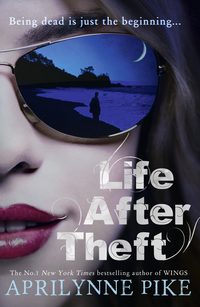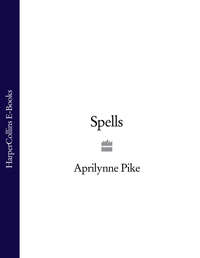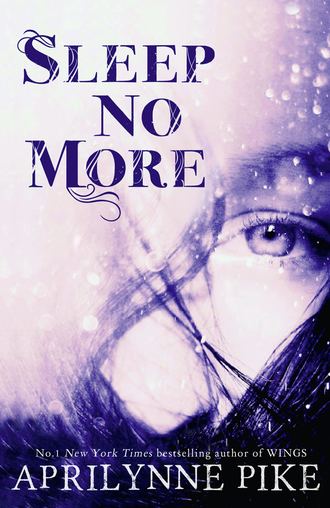
Полная версия
Sleep No More


To the survivors of Newtown
Table of Contents
Cover
Title Page
Dedication
Ten Years Earlier
Chapter One
Chapter Two
Chapter Three
Chapter Four
Chapter Five
Chapter Six
Chapter Seven
Chapter Eight
Chapter Nine
Chapter Ten
Chapter Eleven
Chapter Twelve
Chapter Thirteen
Chapter Fourteen
Chapter Fifteen
Chapter Sixteen
Chapter Seventeen
Chapter Eighteen
Chapter Nineteen
Chapter Twenty
Chapter Twenty-One
Chapter Twenty-Two
Chapter Twenty-Three
Chapter Twenty-Four
Chapter Twenty-Five
Chapter Twenty-Six
Chapter Twenty-Seven
Chapter Twenty-Eight
Chapter Twenty-Nine
Chapter Thirty
Chapter Thirty-One
Chapter Thirty-Two
Chapter Thirty-Three
Chapter Thirty-Four
Acknowledgments
Also by Aprilynne Pike
Copyright
About the Publisher

I sit on the itchy couch and stare at Mommy’s eyes, wishing for them to open. Everyone tells me she’s going to wake up, but it’s been two days. Aunt Sierra promised and the doctor said so.
But Daddy’s not coming back. Ever.
In my vision, it was Sierra who died. I was just trying to stop that.
But things didn’t happen like I thought.
Sierra’s alive. And Daddy’s not.
A lady came in to talk to her. They’ve been outside in the hall for a long time. I look at Mommy and then slide down from the couch and sneak to the door. They’re quiet, but if I put my ear right where the door isn’t quite closed, I can hear them.
“It was supposed to be me,” my aunt says in an angry whisper, and my stomach starts to hurt. I didn’t want her to know. Now she’ll figure out I changed things.
“You?”
“Yes, it was supposed to be me and I did nothing. Give me some credit.”
“Then who?” the other lady asks.
I cross my fingers, but Sierra still tells on me. “It must have been Charlotte. It would’ve terrified her.”
“You know how severe of an infraction this is,” the lady says, and I don’t know what infraction means, but her voice doesn’t sound like it’s something good.
“She’s six!”
“She broke the rules,” the woman says. “You’re one of us, Sierra. And hopefully someday that girl will be as well. But only if you get her under control.”
“I’ve been working with her since she was three!” Sierra argues.
“Then you’re going to have to work harder, aren’t you?”
Sierra says something but it’s so quiet I can’t understand her. Then I hear the loud click of high heels. The lady’s going away. Sierra’s coming back.
I run across the slippery floor and jump onto the couch again just as Sierra pushes the door open and pokes her head in. “Hey, sweetheart,” she says. “Are you hungry?”
I’m not, but when I said no all day yesterday, Sierra got mad. So I nod.
“Let’s go get a snack,” she says, holding her hand out to me.
But she doesn’t take me to the cafeteria. She stops at a vending machine and buys a package of M&M’s and we go to a dim, quiet room with a big cross at the front. It looks like a church, but it seems weird to have a church in the hospital. I guess everyone else thinks it’s weird too, because the room is empty.
Maybe that’s why Sierra brought me here.
“Charlotte,” Sierra says, “you had a vision about this, didn’t you?”
My bottom lip quivers, and tears overflow when I nod.
“And you tried to stop it.”
I nod again, even though the way she said it wasn’t really a question. It’s bad to see the visions at all. Sierra’s been teaching me how to fight them off since I was three.
But it’s hard.
And sometimes it hurts. This one hurt a lot.
“I tried to save you,” I whisper, but I can barely get the words out through my tears. My chin drops to my chest and I feel her pull me onto her lap, where the curled ends of her pretty, blondish-red hair tickle my face.
“I’m going to come live with you,” she says, and I’m so surprised my tears stop with a loud sniff. “Your mom will need a lot of help, and … I’m going to keep an eye on you for a while,” she says, and it sounds like a bad thing.
She lifts my face and rubs my wet cheeks with her thumbs. “Your mom is going to wake up,” she says, her voice very serious. “And when she does, you cannot tell her what happened. You can’t tell her anything.”
“But you said—”
“I know. I hoped that someday we could. But this accident has changed things. We can’t ever tell her now.”
“Why not?” I ask.
“Because … because she might be angry. With both of us,” Sierra says after a long silence, and my chest hurts at the thought of Mommy being mad at me.
“Charlotte, I’m afraid the time has come for you to act much more grown up than you are. It’s going to be difficult, but you have to work very, very hard at following the rules from now on. Do you understand?”
I nod, even though I really don’t.
Sierra glances at the door that leads into the little church place. “Tell me the rules,” she says.
“You know the rules,” I say, rubbing my eyes with my fists.
“Tell me again,” she says, and her voice is very soft and gentle now.
I stare at her, not sure why I have to do this here, but I start to recite anyway. “Never reveal that you are an Oracle to anyone except another Oracle.”
“Good. Two?”
“Fight your visions with all your strength. Never surrender. Never give up. Don’t close your eyes.”
“Three?”
“Never, under any circumstances, change the future.” Sierra nods and a single tear shines on her cheek.
Then I understand.
I did this. Daddy is dead because I didn’t follow the rules. I bury my face in my aunt’s shirt and start to sob.

What I wouldn’t give to live somewhere without snow. Not that there’s any snow actually sticking on the ground yet. Just dead grass and bitterly cold winds. Ugly cold.
Until I open the front door to the high school and am blasted with a mixture of heat, moisture, and noise. The hall is swarming with bodies and music and cell phones chirping, but I put my head down and wander through it like a winding maze.
The space in front of my locker is crowded with people and for a moment I indulge the fantasy that they’re waiting to talk to me. But I know better. Robert Jones is one of the most popular guys in school and his locker is on my right—thus the majority of the crowd.
On my left is Michelle.
We used to be friends. Now we have this wary sort of acquaintanceship. Michelle glances in my direction and even though I see her catch sight of me—that slight widening of her eyes—she gestures to the two girls with her and they walk off together toward the cafeteria.
Whatever.
I bodily shove some big guy talking to Robert out of my way so I can get into my locker.
Unfortunately as I touch the scratched metal surface, I feel a tickling at the edge of my brain.
A vision.
Fan-freaking-tabulous. Just what I need before school even starts.
Now it’s a race to get my locker open so I can crouch down and lean against it and look like I’m doing something. Something else.
I spin to the last number and yank up on the locker handle. It doesn’t budge.
Damn it! I start to try the combo again, but it’s too late. I’m going to have to sit on the floor. My legs bend, almost too easily, and I drop hard to my knees. I lean my forehead against the cool metal and breathe slowly, trying not to draw attention to myself.
The visions themselves aren’t that big a deal; they’re usually over in less than a minute. But I hate getting them in public because in those seconds I’m blind to the world. If no one speaks to me I’m fine—no one notices, the vision eventually dissipates, the world starts turning again, and life continues.
But if anyone tries to get my attention it’s a little hard to miss the fact that I’m completely unresponsive. After that, I suffer mockery for days. Or I used to. It’s a little better now that I’m in high school. People already know I’m a freak and just ignore me. The trade-off is, of course, that everybody knows I’m a freak.
Can’t think about that now. I suck in air slowly, like I’m breathing through a straw, and stare straight ahead. I visualize grabbing a black curtain and pulling it over my inner eye—my “third eye,” as Sierra always calls it—to block out the vision. Mental visuals seem to help.
I’ll be affected by the foretelling no matter what, but if I black out my mind, fill it with darkness, then I won’t see it.
And if I can’t see, I won’t be tempted to do anything about it.
As an added bonus, when I fight it, the vision generally passes more quickly. Which, when I’m at school, is the number one goal.
Sierra spent years trying different methods to help me block out my visions: a big, black paintbrush; turning off an imaginary switch; even covering my third eye with imaginary hands. The black curtain works best for me.
But no one can see what I’m doing on the inside; they only see the outside. And on the outside I’m some girl, kneeling on the dirty floor, my head against my locker, completely still with my eyes wide open.
I can’t close them. Closing your eyes is a gesture of surrender.
I cling to the words I used to resent:
Never surrender.
Never give up.
Don’t close your eyes.
I say them over and over, focusing on the words instead of the force of the vision fighting to get into my head.
An incoming vision feels like a huge hand squeezing your skull, trying to dig its fingers into your brain. You have to push back as hard as you can—with every ounce of concentration you have—or it’ll find a soft spot and get in. The pressure grows to a fever pitch, and then, just as it gets truly painful, it starts to fade. That’s when you know you’ve won.
Today, as usual, I win. It’s so normal, it doesn’t even feel triumphant. As the sensation ebbs away, my body belongs to me again. My lungs cry for air and even though I want to gulp it in, I do the breathing-from-a-straw thing so I don’t hyperventilate. Made that mistake once in fourth grade and passed out. Not my finest moment.
A few more seconds and I’ll be able to see again. Hear again. The noise filters in like turning the volume up on a radio and, as soon as I have the strength, I straighten my spine and let my eyes dart carefully from side to side to see if anyone noticed.
No one’s paying attention. I reach for my backpack and my hand covers a shoe instead. I look up to find Linden Christiansen towering above my head and holding my backpack.
Mortification and delight fight to drown me.
He reaches out a hand and I wish it meant anything other than that he’s a nice guy helping a girl up. But as soon as I’m on my feet, he drops his arm. “Migraine coming on?” he asks, handing over my backpack.
The lie that rules my life. “Yeah,” I mumble.
He’s looking at me and I let myself meet his gaze—and thus risk turning into a babbling moron at the sight of his light blue eyes that remind me of a still pond. “I t-took some new meds this morning,” I stammer, “but I guess they haven’t quite kicked in yet.”
“Do you want to call your mom?” he asks, his forehead wrinkling with concern. “Go home?”
I force a smile and a shaky laugh. “No, I’ll be okay. I just need to get to class and sit down. They’ll start working soon.”
“Are you sure? You want me to carry your backpack or anything?”
I’m tempted to let him. Anything to buy a few more minutes. But the vision has passed—I’m completely fine now. And my ego rebels against faking weakness for a guy.
Even Linden. Who I’ve liked since before my age reached two digits.
It’ll never happen. Even if by some miracle he were interested, there’re those stupid social lines that are practically stone walls separating us. I’m in the Artsy-Semi-Nerd pen. Linden is in the Super-Popular-Don’t-Even-Try-It pen. Despite the fact that he’s so nice. And talks to me sometimes. In choir class mostly. When he’s bored. He doesn’t actually sing very well, he just needs an arts credit.
But he wouldn’t ask me out or anything.
And what would I do if he did? I can’t date anyone. What would I tell the guy when he asks why I’m always so tense and jumpy? That I’m always on guard for unwanted foretellings of the future? Yeah, that’ll break the ice.
How about why I don’t want to go to a movie? Ever. Somehow telling someone I don’t like dim places because—like closing your eyes—they make the visions harder to fight, feels even more embarrassing than the lie that I’m afraid of the dark. Which is what I had to tell friends who used to spend the night—only once, of course, before they realized how weird I was—when they asked why I sleep with my bedside lamp on.
Not night-light. Lamp.
“You’re positive?” Linden asks, and I nod, hating that I want to cry inside. He throws me a grin—a real one, a nice one—and says, “I’ll see you in choir then.”
I wave lamely and watch him walk away. I wish I could just be normal.
But I’m not. I’m Charlotte Westing and I’m an Oracle. The kind you’ve read about who once imparted wisdom and advised great kings and queens and assisted brave knights on their quests. But those Oracles existed a long time ago. When they could actually reveal their foretellings and use them to make lives better.
The world is different now. And our role is different. Oracles once worked with the leaders of civilization to mold, shape, and change the future for the good of mankind. But corruption led to several disasters like the fall of the Roman Empire and the Mongol invasion of China, so the Oracles withdrew their power. From then to present-day, the Oracles have followed an ancient vow to allow the future to unfold as it will. Now, Oracles believe it’s best that no one sees the future. So that no one’s tempted to change it.
So that no one dies because an Oracle doesn’t have the strength to resist that temptation.
A hollow sadness fills my chest and I force it away. The past is gone. No one, anywhere, can do anything about what has already happened.
But the present? That’s what I have to deal with. The visions are part of my life—have been since my first at age three. As soon as I was capable, my aunt Sierra started teaching me how to resist them.
A child should never be burdened with knowledge of the future, she told me, and I tried to believe her even though at the time I was excited that I could “do magic.”
I know better now.

I’m more than ready to be finished with the day when I head into my final class—trigonometry. We’re going over a review test and I’m having trouble paying attention. My external senses feel oddly muffled, the subtle feeling that generally precedes a foretelling.
But I just had one this morning; twice a day is pretty unusual. And this foretelling is being weird. I never like weird. Weird is unpredictable. Usually, once I get the feeling, the vision follows within minutes, max. This time, the sensation has lasted almost half an hour and still nothing.
Class is nearly over when the blackness starts to descend around the corners of my eyes and it’s almost a relief to lay my forehead on my arms so I can get it over with.
Even though all my muscles are tensed and ready, it’s more forceful than usual and I try not to shudder as a painful weight settles on my body.
It feels different this time. It’s a vise that envelops my entire head. Squeezing, squeezing. A moan builds up in my throat and I push it away.
An Oracle never loses control. My aunt’s voice echoes through my head, but her words blow away as a storm thrashes within my brain like a physical thing, battering against my skull until I honestly fear the bones are about to shatter. What is this?! Distantly I feel my fingers grip the edges of my desk and I hold statue-still, scrolling through every tactic my aunt taught me and new ones I’ve come up with on my own throughout the years.
But this vision is too strong. It tosses aside my defenses as though they are tissue paper trying to hold back a stampede.
Within seconds, the formless presence of the foretelling pulses around me. I can still kind of hear Mrs. Patterson answering a question about the radius of convergence, but her voice is getting further and further away as I struggle against a pull that feels like a river, carrying me away in a whirling current. Inside my mind, shadows are emerging. Then I’m spinning, falling.
No, no, no! I shout in my head, trying to grip my desk harder, breathe even shallower.
None of my tricks are working.
I’ve never had a vision this strong. Even when I was younger and didn’t know how to control them, they didn’t overwhelm me quite this way. Some tiny part of me knows that I’m in school, sitting in a classroom surrounded by other sixteen-year-olds, but in the midst of the vision, those facts seem as fantastical as stories of princesses and dragons.
Then, with a brilliant flash of light, the falling sensation stops and my stomach feels like it flips upside down.
My feet are on solid ground.
I’m at the school football field.
It’s dark.
Cold.
Goose bumps rise on my arms, and the air is clammy and damp like I’m standing in a thick fog. The vision pulls me forward, forcing me to walk, bending me to its will as though it were a living thing.
I fight every step even though I know it’s too late. Still I fight. Because I’m supposed to. Because Sierra would expect it.
Because I owe it to my mom and dad to at least try.
I see her feet first.
Clearly a her—small feet clad in maroon ballet flats with little bows over the toes. I focus on those bows. I don’t want to see the rest.
But even where I look is out of my control and my gaze moves up her body. Legs, torso, shoulders. Face. In my mind, I gag and I hope my physical self doesn’t too.
Her eyes are open, sightless and a vivid blue. The splatter of blood across her cheeks is so fine it almost looks like glitter. But deep-red liquid pools under her neck, still dripping from her unmoving body. The puddle spreads as I watch, and the slice across her neck gapes in a grotesque display that makes my whole body rebel.
Get away!
I want to run—need to run—but the vision isn’t finished with me yet. I focus on the rest of her body, taking in the smaller injuries I missed the first time around. Her shirt is torn across her midriff and a long, bloody scratch decorates the skin there. A knife? Fingernails? I can’t tell. Her ankle is twisted at an unnatural angle and her hand is covered in blood starting at the fingertips. Her own? Her attacker’s? There’s no way to be sure.
Charlotte.
The voice is almost singsongy.
Chaaaaarlotte.
“Charlotte!”
I jerk my head up and air rushes into my nose. With a dull shower of sparks, my physical sight fades back in.
“Yes, Mrs. Patterson,” I say as soon as my throat stops convulsing long enough to let me speak. Croak.
“Number twenty-three,” she says, her hand on her hips, her voice heavy with annoyance.
How many times did she call me?
I make my neck tilt down; my eyes have trouble focusing as the numbers swim on my paper.
“One hundred sixty-seven point six eight,” I say, finally locating my answer. I look up and meet her eyes, hoping she’ll just move on. I don’t even care if I got it right. She stares at me for a moment. A beat. Too long? Too short? I don’t know.
“Jake? Twenty-four.”
Thank you.
My breathing returns to normal but my fingers are still clutched around the edge of my desk, pressing so hard they’re white all the way up to the second knuckle. I force them to relax, one at a time, but when I pull my arms back and tuck my hands into my lap, they ache from the tension.
A sheen of perspiration prickles on my forehead and catches the breeze from the heater, making me shiver. More sweat is trickling down my spine, gathering under my arms. I feel gross and worn out and all I want to do is go home and take a nap.
And some ibuprofen.
And something that will make me forget.
Even before I was better at blocking foretellings, the things I saw didn’t always happen—the future is fluid and the glimpses Sierra and I get are simply that: glimpses of how the future is currently set to play out.
But my record is pretty solid. Because unless you do something to change the future—which I would never do again—it’s probably going to flow down the foretold path.
My heart speeds as I try to recall every detail. But it almost hurts to remember. The stark image of the thick, syrupy blood still pouring from the slash across her neck makes my stomach churn. It may not technically have been a real body, but unless something changes, it will be.
The bell rings—shrill and piercing—loud enough to distract me for the tiny second I need. I pull my mind away and take a deep breath, pushing back some of the nausea.
I have to get out of here, I think as I shove my books and papers into my backpack. Get out of this classroom and I’ll be okay. I can go home. Take a nap. Forget about all of this.
I yank the zipper closed and spin toward the door in the back of the classroom, hoping I can walk some semblance of a straight line.
Then I freeze.
Bethany laughs and touches her friend’s shoulder.
I didn’t think about her face in the vision. Didn’t worry about identifying her.
All I saw was that cut. The blood.
She’s alive.
For now.
But she’s wearing those maroon ballet flats.

“I’m home,” I call as I walk in the front door.
“Office,” Mom hollers back.
I’m almost afraid as I approach the converted bedroom where she does medical coding from home. Does it show on my face how stressed I am? I hope not. I can’t talk to her. Not about this.


